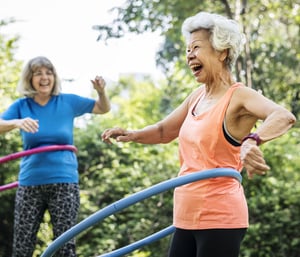Staying Fit as You Age
Benefits of Exercise for Seniors
We all know that we need to exercise to stay healthy. And for seniors, the benefits of exercise are particularly significant. You don’t have to be a marathon runner or bodybuilder to exercise—there are many types of exercise that fit all abilities. A little bit of exercise will reward you with results beyond just toned muscles.
Did you know that exercise can improve cognition, decrease depression, improve heart health, and support bone strength? At Fieldstone Communities, our mission is to create joyful and vibrant living for all our residents. That’s why our monthly calendars are full of fun, engaging fitness classes and activities for all activity levels—because we believe that small choices can effect big changes and improve quality of life.
Whether you’re new to exercise or want to get back into a fitness program, we hope this information will help you find an exercise routine to keep you active, so you can live a joyful and vibrant life.
Health Benefits of Regular Exercise for Seniors
Improved balance and coordination
Exercise programs like walking, yoga, and strength training are ideal for improving balance and coordination. Falls are the leading cause of injuries for older Americans. An exercise program that focuses on improving balance can help reduce the risk of falls and allows for more independence.
Bone and Immune System Support
Every time you exercise, your immune system gets a boost. This will help ward off sickness and illness. Regular physical activity also helps prevent injuries by keeping you flexible and strong, while reducing risk of osteoporosis, heart disease, diabetes, and some cancers.2
Improved Mood and Mental Health
It might surprise you that regular exercise can be a better workout for your brain than reading or doing puzzles. That’s because staying active increases your levels of endorphins (hormones that have positive effects on many things in the brain and body), improving moods and decreasing stress levels. All of these brain-boosting benefits work together to help keep you feeling happier, decrease memory loss, help you sleep more soundly, and reduce risk of Alzheimer’s and other dementias. Recent studies show that exercise can improve cognition, even for seniors with dementia.
Set Yourself Up For Success
- Check with your doctor first to talk about which types of exercise are best suited for your current health level so they can help develop a plan that works for you. Be sure to discuss any medications you take with your doctor.
- Always stretch before and after exercise. Warming up before and cooling down after exercise will help your body adjust, reducing chance of injuries.
- Stay hydrated. Your body uses more fluids when you’re active, so be sure to drink plenty of water.
- Pay attention to your body. Ease into a routine and don’t push yourself too hard. Exercise shouldn’t hurt or cause you to feel bad. If you experience pain, shortness of breath, dizziness, or other uncomfortable symptoms, stop exercising and call your doctor.
Getting Started
- Start small and work your way to more. If you’re new to exercise or haven’t been active in a while, it’s best to start small. Do some gentle stretches a few times a day, or just take a short walk around the house. Every little bit of activity helps, so don’t worry about trying to do everything at once. The important thing is to just do something every day.
- Find a group or a friend. Having someone to exercise with can make a world of difference. You’ll enjoy the company of a friend, and you can each offer encouragement and accountability. You’ll find it easier to stick with your fitness program if you know someone else is depending on you.
- Get outdoors. From gardening to nature photography to landscape painting, there are countless things to do outside. If you can develop a new hobby that requires being out in nature, you’ll be getting exercise without even needing to think about it—all while enjoying something new and stimulating. Being in nature can do wonders for our mental health. It can help us clear our minds, better manage stress or anxiety, and boost our moods.
Tips to Keep Going
- It’s important to focus on feeling good rather than long-term goals. Be kind to yourself as you find a routine. As you discover what types of exercise you enjoy and what works for you, try to simply commit to some type of regular exercise. In due time, you’ll find a routine that suits you.
- Studies show that when you focus on being fully present in the moment—you’ll be more happy in your life overall. Breathe in the fresh air, feel your muscles moving, and enjoy your heart pumping.
Want to learn more? The National Institute on Aging has an excellent resource page on exercise including types of exercises, tips, and the latest scientific breakthroughs.
There are lots of opportunities at Fieldstone—whether it’s gardening, walking, stretching, dancing, or more, we’d love to help you find new ways to stay active.
Please talk with your community’s life enrichment director, and we’ll help you with ideas, find a group or class, or help connect you with other community members who can be active with you.


